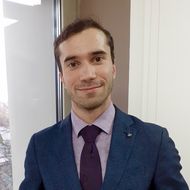- A
- A
- A
- ABC
- ABC
- ABC
- А
- А
- А
- А
- А
- HSE University
- Faculties
- Faculty of Economic Sciences
- School of Finance
- News
- 'In the Future I Want to Open a Business School in Nigeria'
-
The School
-
RESEARCH ACTIVITIES
- Laboratories
- Series “Advanced studies in emerging market’s finance” at Springer Nature o Networking with international academic associations
- Networking with international academic associations
- Research seminars
- International PhD workshop
- The International Seminar «ESG Transformation»
-
RESEARCH WORKING GROUPS
- Research Working Group "Innovations in the banking sector, its financial stability and prudential regulation"
- BUSINESS EDUCATION
- Networking with business associations
- Networking with professional associations
- Center for Research on Non-Financial Reporting
-
DATABASES
119049 Moscow, Russia
11 Pokrovskiy boulevard, room S629
Phone:
+7 (495) 772-95-90*27447, *27947, *27190
+7 (495) 916-88-08 (Master’s Programme Corporate Finance)
- Email: df@hse.ru
Head of Corporate Finance Research Center, Dr., tenured professor

+7495-772-95-90 (add. 27447)

+7495-772-95-90 (add. 27947)
The HSE School of Finance is the leading Russian competence center in the field of corporate finance, business valuation, banking, stock market, risk management and insurance, accounting and audit.
HSE is the first Russian university in the global ranking "QS - World University Rankings by subject", 2022 in the subject area of Accounting and Finance. Moreover, the university is the 1-st in the rating "THE World University Rankings by subject" in the subject area of Business & Management Studies, 2022
Cherkasova V. A., Nenuzhenko I.
Journal of Economic Integration. 2022. Vol. 37. No. 1. P. 54-92.
Electronic Journal of Applied Statistical Analysis. 2022. Vol. 15. No. 1. P. 187-210.
Kolade S. A., Semenova M.
Financial Economics. FE. Высшая школа экономики, 2022. No. WP BRP 87/FE/2022.
Управление финансовыми рисками. 2022. Т. 70. № 2. С. 108-120.
In bk.: The 8th International Conference on Information Technology and Quantitative Management (ITQM 2020 & 2021): Developing Global Digital Economy after COVID-19. Vol. 199: The 8th International Conference on Information Technology and Quantitative Management (ITQM 2020 & 2021): Developing Global Digital Economy after COVID-19. Manchester: Elsevier, 2022. P. 798-805.
Korablev D., Poduhovich D.
Journal of Corporate Finance Research. 2022. Vol. 16. No. 1. P. 136-145.
Olkhovik V., Lyutova O. I., Juchnevicius E.
Научно-исследовательский финансовый институт. Финансовый журнал. 2022. Vol. 14. No. 2. P. 73-90.
Churyk N. T., Anna Vysotskaya, Kolk B. v.
Journal of Accounting Education. 2022. Vol. 58.
Абдрахманова Г. И., Васильковский С. А., Вишневский К. О. и др.
М.: Издательский дом ГУ-ВШЭ, 2022.
Абдрахманова Г. И., Васильковский С. А., Вишневский К. О. и др.
М.: Национальный исследовательский университет "Высшая школа экономики", 2022.
Гришунин С. В., Сулоева С. Б., Пищалкина И. И.
Организатор производства. 2022. Т. 30. № 1. С. 60-72.
Гришунин С. В., Сулоева С. Б., Пищалкина И. И.
Экономический анализ: теория и практика. 2022. Т. 21. № 3. С. 478-496.
S. Grishunin, E. Naumova, N. Lukshina et al.
Russian Management Journal. 2021. Vol. 19. No. 4. P. 475-493.
Journal of Corporate Finance Research. 2022. Vol. 16. No. 1. P. 99-112.
Grishunin S., Bukreeva Alesya, Alyona A.
In bk.: The 8th International Conference on Information Technology and Quantitative Management (ITQM 2020 & 2021): Developing Global Digital Economy after COVID-19. Vol. 199: The 8th International Conference on Information Technology and Quantitative Management (ITQM 2020 & 2021): Developing Global Digital Economy after COVID-19. Manchester: Elsevier, 2022. P. 190-197.
 International Conference “Future Directions in Accounting and Finance Education”, 27-28 May 2019, Moscow, Russia
International Conference “Future Directions in Accounting and Finance Education”, 27-28 May 2019, Moscow, Russia
Edited by: А. Б. Высотская, B. v. Kolk.
Vol. 58. Elsevier, 2022.
Karamysheva M., Seregina E.
Journal of International Money and Finance. 2022. Vol. 127.
In press
Journal of Economic Dynamics and Control. 2022. Vol. 137.
Karamysheva M., Skrobotov A.
Journal of Economic Dynamics and Control. 2022. Vol. 138.
Известия Санкт-Петербургского государственного экономического университета. 2022. № 4. С. 144-155.
Тихомиров Д. В., Цехомский Н. В.
Экономика и управление. 2022. Т. 28. № 1. С. 16-24.
Селезнёва З. В., Евдокимова М. С.
Финансы: теория и практика. 2022. Т. 26. № 3. С. 64-84.
Evdokimova M., Stepanova A. N.
In bk.: 38th EBES Conference - Program and Abstract Book. Istanbul: EBES, 2022. P. 39.
Assanskiy A., Shaposhnikov D., Tylkin I. et al.
Journal of Behavioral and Experimental Economics. 2022. Vol. 98.
Teplova T., Mikova E., Munir Q. et al.
Economic Change and Restructuring. 2023. Vol. 56. No. 1. P. 515-535.
Повх К. С., Кокорева М. С., Степанова А. Н.
Экономический журнал Высшей школы экономики. 2022. Т. 26. № 1. С. 9-36.
Anton Markov, Zinaida Seleznyova, Victor Lapshin.
Journal of Finance and Data Science. 2022. Vol. 8. P. 180-201.

'In the Future I Want to Open a Business School in Nigeria'

Graduate of HSE University and University of Luxemburg Tobi Oladiran from Nigeria reflects on his experience and takeaways from the Master’s programme in Strategic Corporate Finance and the double track it offers.

Tobi Oladiran
Choosing HSE University
Before applying to HSE University, I worked at one of the biggest automobile companies in my country. One day I was researching master’s programmes and I saw Strategic Corporate Finance. I thought that I should apply as this can take me to the top. I’m fascinated with strategic decisions so the programmme sounded very interesting.
Then I tried to understand the structure of the programme and I noticed that you can do a double degree programme. Two years, two degrees, two countries—it sounded pretty interesting as not a lot of universities offer this kind of structure, especially two robust programmes combined into a two-year period.
Getting Involved in Research
My motivation for research came after I did some work at the Corporate Finance Lab at HSE University and realized that you can contribute a lot to the world if you're trying to bring theory and practice together.
In addition, in the future I plan to go back to my country to create a business school. Finally, I’m currently doing research work in the areas that I love. One is sustainable finance and two is mutual funds.
I’m looking at sustainable challenges in mutual funds. This means that it is a very practical application and I’m working with real-life data so it's not like I’m just doing theoretical work. Also, sustainable finance is the focus of everyone’s attention now, so it's really the new trend.
Earlier, Tobi’s Ph.D. project The Sustainability Challenge of Mutual Funds was selected for funding by the Luxembourg National Research Fund.
My current programme is almost if not entirely dependent on what HSE University has really done for me. I would like to thank Oxana Budjko, from the International Office of the Faculty of Economic Sciences, because she helped me a lot and gave me information about the double degree programme. She was the one who told me that I’d been nominated to do my second year at the University of Luxembourg!
So, when I got to UniLu started my programme in economics and finance, I realized that the new trend is sustainable finance, which I find quite interesting. Тhat's why I have moved in this direction.
It is HSE University that launched me into this particular field. I enjoyed a lot of support from HSE University even while here at the University of Luxembourg
HSE University Сourses
The most interesting and the most valuable courses at HSE University were Business Valuation and Financial Modeling. I also find Theory of Finance very interesting and that's why I chose Victoria Rodina to be my supervisor for the master thesis.
I would add that I also enjoyed Advanced Microeconomics from Andrey Dementiev. Lastly, I should mention Corporate Finance taught by Professor Irina Ivashkovskaya. She's always very busy, but she always answers all the questions immediately. I want to say that the majority of professors at HSE University welcome students’ opinions. The most challenging course for me was Microeconomics by Alla Fridman. And it was challenging for everybody, not just me.
The Value of Teamwork
The programme involves a lot of group projects, so part of your academic success depends on your team. A strong team will allow you to build good knowledge and also get good grades. Most times, you will learn a lot from your team rather than from your lecturer. The lecturer just comes to give you the skeleton. Then you go back home and you develop the body with the help of contributions from your team members. You have to be willing to work with people because most times you learn from them.
I was really fortunate to work with a very good team—there were two very strong students on my team so I learned a lot from them. When we were asked to change to another team, I wanted to stay with my team and to be able to continue working with them.
Future Plans
My goal in life is to create a business school that is going to train young people to be able to deal with the challenges in my country, so I’m going to retire either as a lecturer or a manager of a business school.
However, before that I’d like to try to create high-quality education back home where the income of the people is relatively low. Right after my studies, I plan to stay in Luxembourg for two years and build my network and after that, I’m going back to my country.
Luxembourg is a developed market and Nigeria is an emerging market. There are a lot of cultural differences between the two. I started to think about this back in Moscow and I discussed this issue with one of my professors, Victoria Rodina, my thesis supervisor. My concern was that I was gaining a lot of knowledge that might not be applicable when I go back to my country.
That is actually also where the idea of this business school is coming from—we should train the next generation to be able to handle the process of moving towards being a developed country. Since I’m going to be educating the next generation, the knowledge I’ve gained should be useful.
That is actually also where the idea of this business school is coming from—we should train the next generation to be able to handle the process of moving towards being a developed country. Since I’m going to be educating the next generation, the knowledge I’ve gained should be useful.
I went back home to do an internship in strategic corporate finance at PWC in order to understand what is really going on in my own markets. What I’m trying to do now is to draw the comparison between the two countries and I believe that when I go back home that might be the first lesson to learn—how different our own market is compared to developed ones. There are some things that are still pretty much applicable when you go back home.
HSE University welcomes applicants from all over the world and offers not only different levels of study, but also different formats in English and Russian, online and offline. International applicants can apply for Bachelor’s and Master’s degree programmes in a separate admissions process for foreign applicants and receive scholarships with full or partial tuition fee coverage.
Master’s applicants also have the opportunity to get a preliminary assessment of their portfolio and communicate with their programme of choice online.
There are also ZOOM consulations available for graduate and undergraduate applicants.
Interview prepared by Aigerim Omarbekova, first-year international student of the Strategic Corporate Finance programme.
Oxana P. Budjko
Head of International Office (Faculty of Economic Sciences)
Andrei Dementiev
Senior Lecturer at the Department of Theoretical Economics
Irina Ivashkovskaya
Head of the School of Finance
Victoria Rodina
Senior Lecturer at the School of Finance
Alla Fridman
Professor at the Department of Theoretical Economics
- About
- About
- Key Figures & Facts
- Faculties & Departments
- International Partnerships
- Faculty & Staff
- HSE Buildings
- Public Enquiries
- Studies
- Admissions
- Programme Catalogue
- Undergraduate
- Graduate
- Exchange Programmes
- Summer University
- Summer Schools
- Semester in Moscow
- Business Internship
-
https://elearning.hse.ru/en/mooc/
Massive Open Online Courses
-
https://www.hse.ru/en/visual/
HSE Site for the Visually Impaired
-
http://5top100.com/
Russian Academic Excellence Project 5-100
- © HSE University 1993–2024 Contacts Copyright Privacy Policy Site Map
- Edit


